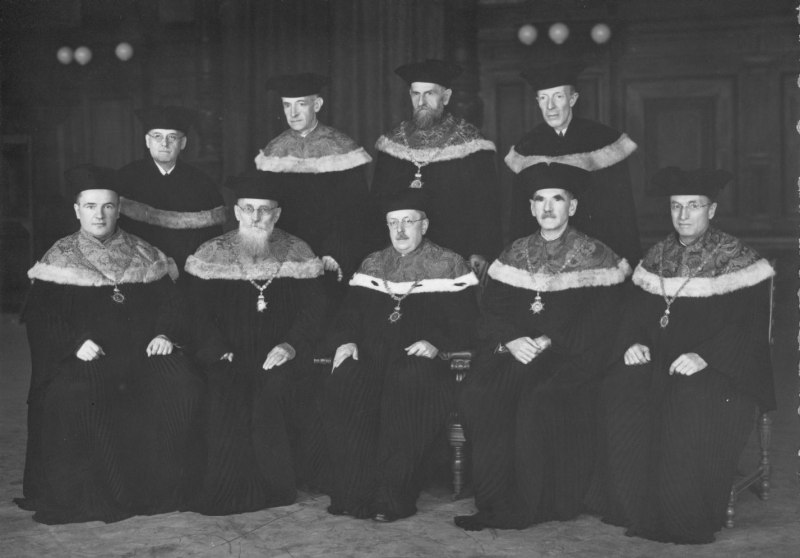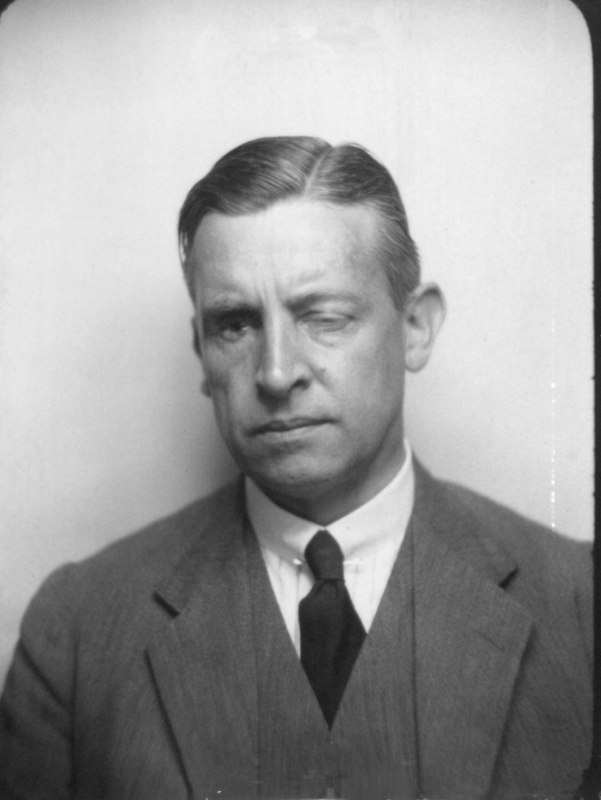Ferdinand Graf von Degenfeld-Schonburg, o. Univ.-Prof. Dr. jur., Dr. phil.
Functions
| Dean | Faculty of Law and State | 1933/34 |
| Dean | Faculty of Law and State | 1945/46–1946/47 |
| Senator | Faculty of Law and State | 1948/49 |
| Senator | Faculty of Law and State | 1949/50 |
| Senator | Faculty of Law and State | 1950/51 |
| Senator | Faculty of Law and State | 1951/52 |
- Legal Science
- National Economics
- Political Economy
- Faculty of Law and State
Degenfeld-Schonburg, the son of an imperial-royal field marshal lieutenant, who had been a tutor to the archduke’s heir Franz Ferdinand and his brother Otto, attended the Jesuit school in Feldkirch and the secondary school in Ravensburg, graduated in 1902 and then studied law at the Universities of Innsbruck, Freiburg im Breisgau, Berlin, Strasburg and Vienna. In 1907 he passed the law clerk exam in Strasburg and obtained his doctorate of jurisprudence in Freiburg under Alfred Schulze with the dissertation “Stammeinlage und Geschäftsanteil bei der Ges.m.b.H.”. Since he was especially interested in the relationship of the social question with political economy, he turned to further studies of national economy, philosophy and agricultural economics. In 1914 he became a doctor of philosophy at the University of Berlin with his methodological study “Die Lohntheorien von Adam Smith, David Ricardo, John Stuart Mill und Karl Marx”. Through his studies on Germany, Degenfeld-Schonburg had mainly come to know the newer historical school of economics. He had heard lectures by Max Sering, Gustav Schmoller, Werner Sombart and Adolph Wagner. During two years at the University of Vienna he had also come into contact with the Austrian school of economics and had attended Eugen Böhm-Bawerk’s seminar. He had begun work on a dissertation under Friedrich Wieser and Eugen Philippović, which he finished in Berlin under Max Sering, the most famous German agricultural economist of his time.
In the First World War he volunteered as a nurse and was stationed at the Belgian, Polish and French front as a war volunteer from April 8th, 1915. On July 7th, 1916, he was severely wounded. Because of this his right thigh had to be amputated and his right eye removed. After being promoted to retired lieutenant of the Landwehr (reserve forces) Degenfeld-Schonburg returned to Berlin in the fall of 1917, where he worked on his habilitation as Sering’s assistant. Furthermore, he was a member of the scientific commission of the war office from June 1918 until spring of 1919.
In 1920 he habilitated with the paper “Die Motive des volkswirtschaftlichen Handelns und der deutsche Marxismus” at the University of Marburg for the subject of national economics and taught there as a private lecturer until he accepted a call as an associate professor to the University of Würzburg in 1923. When Carl Grünberg’s chair had been vacant for several years, Degenfeld-Schonburg – who had received a call to Rostock at the same time – was made full professor at the faculty for law and political sciences on October 20th, 1927. Beginning in the summer semester of 1928 he represented the subject of political economy and taught social politics, national economic politics and economic history and held the related courses. From the academic year of 1928/29 onwards he also was director of the “Seminar für Volkswirtschaftslehre und Gesellschaftslehre” (“Seminar for Political Economy and Social Science”) and was a member of the board of trustees of the “Österreichische Wirtschaftspsychologische Forschungsstelle” (“Austrian Economic Psychological Institute”). During Austrofascism he acted as Dean (1933/34) and – together with Josef Nadler – as president of the annual summer university courses at the castle Traunsee.
In the focus of Degenfeld-Schonburg’s studies stood scientific development and social order, his scientific approach being shaped by his Catholic religion. Already in his dissertation and habilitation papers he had addressed Marxism, as well as later in “Wirschaftsantriebe des Liberalismus und Sozialismus” (1926) and in a text for the 40th anniversary of the encyclical, “Sozialpolitische Forderungen der Enzyklika rerum novarum” (1931). Like his colleague Hans Mayer, Degenfeld-Schonburg also studied the social problem of unemployment among academics, in particular in his book “Geist und Wirtschaft. Betrachtungen über die Aussichten der deutschen Akademiker” (1927). In the “Jahrbücher für Nationalökonomie und Statistik” he, among other things, published the papers “Wettbewerbsstreben und Ertragsgestaltung” (1941) and “Grundlinien einer Theorie der wirtschaftlichen Entwicklung” (1949).
As a representative of the historical school of economics and in competition to the next, non-university generation of the Austrian school of economics, Ferdinand Degenfeld-Schonburg was not able to leave a permanent mark outside of his tight sphere of influence at the University of Vienna. He was also impeded by his wounds from the First World War. Students described him as “pleasant and eminently decent”, but as a “not at all brilliant man” (Alexander Gerschenkron), sometimes even as a “complete nonentity” (Fritz Machlup). Machlup came to this assertion mainly because of Degenfeld’s blatant anti-Semitism, giving an insight into daily university life in the interwar period: When Machlup asked Degenfeld to support his habilitation, he supposedly answered that he could not habilitate a young Jew. According to Machlup’s memory, the reasoning was this:
“There’s another reason why I cannot vote for you. The Jews are precocious. With this precociousness they appear much brighter at an earlier age. If we then pick the Jew who shows promise at an early age, we would really be discriminating against the Aryans, the non-Jews. And, hence, I cannot vote for a young Jew.”
His anti-Semitism notwithstanding, Ferdinand Degenfeld-Schonburg was “suspended until further notice” on April 22nd, 1938, and was sent into retirement at the end of August 1938 in accordance with §6 of the Verordnung zur Neuordnung des Berufsbeamtentums (act for the restructuring of career civil service). The main reasons were his Catholic religion and his close relationship to the authoritarian corporative state. Wenzel Gleispach judged him as follows: “Definitely with legitimistic views, downright hostile to National Socialism. In this sense petty, with a narrow horizon and pedantic”. Degenfeld’s successor was someone reprimanded during Austrofascism: Emanuel Hugo Vogel, who had been sent into retirement from his position as rector of the University of Natural Resources and Life Sciences in 1934 for his activity for the illegal NSDAP. Degenfeld was not able to return to any university in the “Third Reich” and no other professional activity is recorded for this time.
After the end of the war he immediately returned to the University of Vienna and as Dean became a part of the academic senate from May 1945 until September 1946. He was officially reinstated into office on September 6th, 1945, while he already had returned to teaching in the summer semester. Other important events were the conferral of the position of full professor by the federal president (1947), the appointment to the position of senator (1948), and becoming chairman of the institute for economic sciences after Hans Mayer’s retirement (1950). He was not able to finish his honorary year granted in 1952 (1952/53) due to his death shortly thereafter.
He was a corresponding member of the Austrian Academy of Sciences (1946).
Archiv der Universität Wien, Rechts- und Staatswissenschaftliche Fakultät, Personalakt 296. | Archiv der Universität Wien, Rektoratsakten GZ 677-1937/38. | Archiv der Universität Wien, Vorlesungsverzeichnis Sommersemester 1945. | Österreichisches Staatsarchiv/Archiv der Republik, Bundeskanzleramt, Bestand „Berufsbeamtenverordnung“ (BBV). | Österreichisches Staatsarchiv/Archiv der Republik, Bestand Unterricht, Personalakt Degenfeld-Schonburg. | Österreichisches Staatsarchiv/Allgemeines Verwaltungsarchiv, Bestand Unterricht, Personalakt Degenfeld-Schonburg.
Zuletzt aktualisiert am 08/27/21
-

Academic Senate of the University of Vienna, academic year 1946/47
Rektor Ludwig Adamovich mit den Mitgliedern des Senats obere Reihe: Richard Meister (Senator Philosophische Fakultät), Wilhelm Czermak (Dekan...

